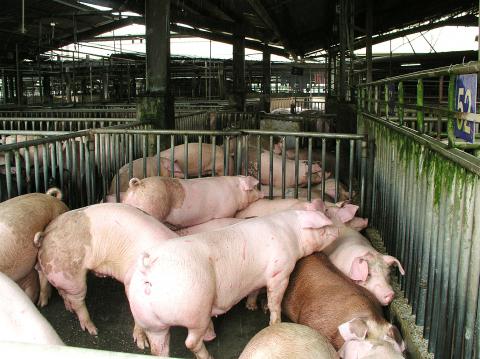Livestock and poultry farmers from across the country will stage a protest on March 3 in Taipei against easing restrictions on imports of beef with ractopamine residue from the US, one of the organizers confirmed yesterday.
“More than 10,000 pig, cattle and chicken farmers and workers will join the protest,” said Yang Guan-chang (楊冠章), director of the Republic of China Swine Association.
The protesters will first march to the Legislative Yuan, then to the Council of Agriculture and the Department of Health to voice their opposition to any government attempt to relax its zero-tolerance policy on ractopamine in US beef, Yang said.

Photo: Liao Shu-ling, Taipei Times
The date of the protest was finalized at a meeting of livestock industry stakeholders and food safety groups in Greater Taichung earlier in the day, Yang said. The groups included the Homemakers’ Union and Foundation and the Taiwan Consumers’ Foundation, he added.
The protest was planned amid rumors that the government might bow to US pressure and allow imports of US beef that contain regulated amounts of the feed additive ractopamine, while maintaining its total ban on the use of the drug by local farmers.
Democratic Progressive Party Legislator Wu Ping-jui (吳秉叡) said yesterday he will submit a legislative proposal for a national referendum on whether to set permissible levels of ractopamine in US beef.
Wu said he will seek the legislature’s approval to petition the Central Election Commission to start the referendum process.
He said that, as a number of domestic experts have warned that opening the market to residue-laden beef would pose health risks, the government should not rush to any decision.
“If the government really wants people to accept US beef containing ractopamine, it should allow the people to have the final say,” Wu said.
However, People First Party caucus whip Thomas Lee (李桐豪) expressed concern that if the referendum failed, it could be used as a tool to open the nation’s doors fully to US beef imports.
Lee said the problem could be resolved by revising legislation, an option that he said would also take the pressure off the government.
The use of ractopamine in livestock farming is allowed in more than 20 countries around the world, besdies the US, but is banned in the EU, China and Taiwan.

Taiwan is stepping up plans to create self-sufficient supply chains for combat drones and increase foreign orders from the US to counter China’s numerical superiority, a defense official said on Saturday. Commenting on condition of anonymity, the official said the nation’s armed forces are in agreement with US Admiral Samuel Paparo’s assessment that Taiwan’s military must be prepared to turn the nation’s waters into a “hellscape” for the Chinese People’s Liberation Army (PLA). Paparo, the commander of the US Indo-Pacific Command, reiterated the concept during a Congressional hearing in Washington on Wednesday. He first coined the term in a security conference last

Prosecutors today declined to say who was questioned regarding alleged forgery on petitions to recall Democratic Progressive Party (DPP) legislators, after Chinese-language media earlier reported that members of the Chinese Nationalist Party (KMT) Youth League were brought in for questioning. The Ministry of Justice Investigation Bureau confirmed that two people had been questioned, but did not disclose any further information about the ongoing investigation. KMT Youth League members Lee Hsiao-liang (李孝亮) and Liu Szu-yin (劉思吟) — who are leading the effort to recall DPP caucus chief executive Rosalia Wu (吳思瑤) and Legislator Wu Pei-yi (吳沛憶) — both posted on Facebook saying: “I

The Ministry of Economic Affairs has fined Taobao NT$1.2 million (US$36,912) for advertisements that exceed its approved business scope, requiring the Chinese e-commerce platform to make corrections in the first half of this year or its license may be revoked. Lawmakers have called for stricter enforcement of Chinese e-commerce platforms and measures to prevent China from laundering its goods through Taiwan in response to US President Donald Trump’s heavy tariffs on China. The Legislative Yuan’s Finance Committee met today to discuss policies to prevent China from dumping goods in Taiwan, inviting government agencies to report. Democratic Progressive Party Legislator Kuo Kuo-wen (郭國文) said

Sung Chien-liang (宋建樑), who led efforts to recall Democratic Progressive Party (DPP) Legislator Lee Kun-cheng (李坤城), was released on bail of NT$80,000 today amid outcry over his decision to wear a Nazi armband to questioning the night before. Sung arrived at the New Taipei District Prosecutors’ Office for questioning in a recall petition forgery case last night wearing a red armband bearing a swastika, carrying a copy of Adolf Hitler’s Mein Kampf and giving a Nazi salute. Sung left the building at 1:15am without the armband and covering the book with his coat. Lee said today that this is a serious